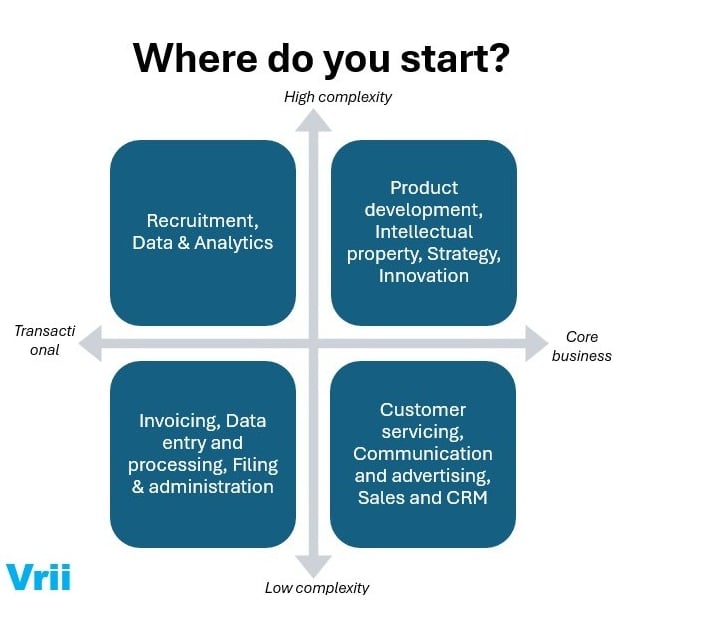discover, embed and empower your business with ai
AI Automation: where to start for SMEs
A 10-person logistics company automated 87% of their manual data entry—freeing up 220 hours for client growth projects. AI isn’t about replacing your team—it’s about freeing them to do what only humans can.
2/11/20252 min read
Business owners, you might wonder given all the technology that's available, where to I start using and how does it help my business.
There is a lot of buzz around AI, too many solutions to choose from, which ones will suit you and will they even help your business. One thing to keep in mind about anything you want to do:
AI isn’t here to replace you, your creativity or your business’s unique value. Instead, it’s a force multiplier to enable you to be more effective in what you do.
Let’s break down where AI fits—and where it doesn’t—using a simple framework, with your business as the starting point:


Let’s categorize your activities along two dimensions:
Transactional vs. Core: Is the activity routine and repetitive, or is it central to your business’s unique value?
Simple vs. Complex: Is the activity straightforward and rules-based, or does it require nuanced decision-making?
Here’s how this framework applies to your business:
What This Means for Your Business
When AI handles repetitive and non-core value adding work, you gain:
Time to innovate or deepen customer relationships
Reduced errors in tasks like invoicing or inventory tracking
Scalability without overburdening your team
So how do I to exploring AI (Without Overhauling Your Business)?
Audit repetitive tasks: What drains time but adds little strategic value
Pilot small: Automate one workflow (e.g., email triage) and measure the impact.
Empower your team: Train staff to collaborate with AI tools, not fear them.
Curious About AI’s Potential for Your Business?
If you’re wondering where to begin, let’s have a conversation—not a sales pitch. 👉 Explore Your AI Readiness
In a free 30-minute consultation, we’ll:
Review 1-2 workflows where AI could make an immediate impact
Discuss how to integrate automation without disrupting your team
Leave you with actionable next steps, tailored to your goals
1. Tasks to Automate (Transactional + Simple)
Examples:
Invoice processing (e.g., repetitive, manual and error-prone, because of invoicing formats and data-entry)
Basic customer inquiries (e.g., “Where’s my order?” or “What are your hours?”)
Report generation (automating this can reduce errors by up to 90%)
AI's role: Automate!!!
These activities take up valuable time, and distracts from your team's focus on creative problem-solving and relationship-building.
2. Tasks to Keep Human-Centric (Core + Complex)
Examples:
Strategic planning
Creative campaign ideation
High-stakes client negotiations
AI’s role here?
Support—not replace. Use it to analyze data or surface insights, but let humans lead.
3. The Hybrid Zone (Grey Areas)
Examples:
Lead prioritization: AI filters prospects, your team closes deals
Recruitment: AI screens CVs, you focus on cultural fit
AI’s role here?
AI can handle the predictable parts while your team focuses on the nuanced, human-centric aspects.
Vrii consulting
Empowering SMEs through AI-driven solutions and strategies.
Contact
Focus
william@vriiconsulting.com
© 2025. All rights reserved.